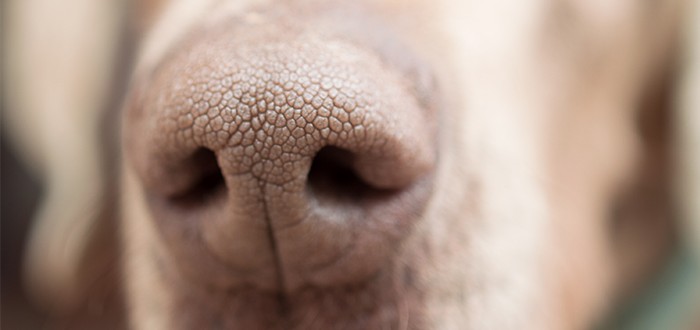Having mesothelioma stinks. A mesothelioma diagnosis is terrible news for the patient and loved ones. Not just figuratively, but literally.
Like all cancers, mesothelioma gives off a unique scent. You can’t smell it, it’s so faint. But a dog can.
For that reason, researchers are hoping to train man’s best friend to be mesothelioma’s worst enemy — at least when it comes to diagnosing the disease.
A study underway in Britain involves dogs sniffing urine samples suspected of containing prostate cancer cells. The dogs have been doing a great job detecting the presence of those cells.
So far, they’re finding the cancer cells 93 percent of the time. That’s superior to the accuracy rate of a PSA test — the current gold standard for prostate cancer detection. PSA stands for prostate specific antigen. Therefore the answer to the question of “can dogs smell cancer cells that cause diseases such as mesothelioma,” is yes.
The PSA test entails drawing a blood sample which then is analyzed in a lab. It’s a good test, but known for returning a high number of false positives.
The only way to be rule out a false positive PSA test is by undergoing a biopsy of the prostate. Medical professionals are concerned that too many patients forced to endure a prostate biopsy end up being told they have no cancer.
Doctors would like a way to cut down on the need for so many unnecessary biopsies. This is where things start going to the dogs.
Mesothelioma Odor Comes from Cell Division
The use of the sniffer dogs in this prostate cancer study is taking place at Milton Keynes University Hospital to the northwest of London.
The study was proposed by a scientist whose own dog alerted her that she was in the early stages of breast cancer about six years ago.
The researchers are for now concentrating just on prostate cancer. However, they say the science behind all this is applicable to any cancer in which tumor cells grow by dividing.
That’s exactly how mesothelioma cells grow, by splitting apart. A byproduct of cell division — regardless of whether the cell is healthy or cancerous — is the generation of various organic compounds.
These compounds give off a distinctive odor. The compounds associated with healthy cells smell one way. The compounds associated with cancer cells smell another.
Dogs can pick up the scent of those compounds if the compounds are present in urine or breath. And they can differentiate between the healthy and cancerous odor. Not only that, but dogs can detect the scent of cancer almost instantly and give an accurate mesothelioma diagnosis.
The researchers are particularly excited about that. The reason is that a single dog could potentially check hundreds of samples a day. No human working with a microscope could come close to matching that kind of volume for finding a mesothelioma diagnosis.
Dogs are able to smell cancer because their noses are equipped with 300 million sensory receptors. By comparison, human noses have only a paltry 5 million sensory receptors.
Training Needed for Dog to Learn to Smell Cancer
It takes about six months to train a dog to signal that a urine sample contains cancer cells. The training involves having the dogs sniff a row of eight vials of urine.
Only one of those vials will have cancer cells in it. The dogs are trained to pace back and forth in front of the vials, then stop in front of the one that smells of cancer.
The dogs are also trained to bark at the cancer-containing vial to confirm that they’ve picked up the scent.
So, in the future, you might visit your mesothelioma doctor’s office and be greeted by a friendly Labrador retriever sitting at the reception desk. If that happens, at least you’ll know why the dog is there and the answer to the question “can dogs smell cancer”?

